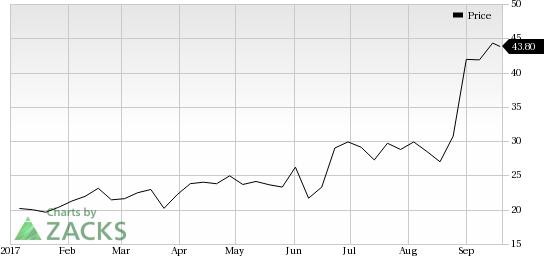Biotech stocks bounced back strongly this year after a poor show last year despite challenges like rising competition, slowdown in growth of mature products and generic competition for certain key drugs. Strong clinical results, faster FDA approvals, success of new products and significant contributions from established drugs have led to the rally in the biotech sector.
The NASDAQ Biotechnology Index gained 24.6% so far this year. This is in sharp contrast to last year’s performance when the index was down 22%.
However, despite the strong performance, investors are keen to know whether the rally will continue and what factors will drive the same.
These companies are likely to see continued demand for their products, given an accelerated increase in aging population and the proportionate increase in diseases.
Moreover, the FDA has approved far more drugs so far in 2017 than it did in the whole of 2016. Hence, a faster drug approval process along with strong pipelines, innovative treatments, impressive results, and increased health care spending should support further growth in the sector.
Though the momentum in the biotech sector is likely to continue, it’s a good idea to avoid a few stocks that will possibly lose their momentum soon despite significant year-to-date gains.
3 Small Biotech Stocks to Avoid
Avoiding stocks that have represented significant share price gain could be a bit tricky. However, we have taken the help of the Zacks Stock Screener to identify stocks, which may stop rallying in the near term. To shortlist the stocks from the vast universe of biotech sector, we have picked stocks that carry a Zacks Rank #4 (Sell) or 5 (Strong Sell).
Moreover, we have also taken into consideration stocks that witnessed negative estimate revisions for the current year over the last 60 days as these are likely to plunge further and should be dumped.
Keryx Biopharmaceuticals Inc. (NASDAQ:KERX) : This New York-based biopharmaceutical company focuses on treating patients suffering from renal disease. The company’s shares have risen 20.1% so far this year. However, it currently carries a Zacks Rank #4. Further, over the last 60 days, the loss per share estimates widened by 92.5% for 2017. Though the company’s label expansion efforts for its only marketed drug, Auryxia bode well for growth, supply interruption of Auryxia, may hurt sales in future quarter.
Juno Therapeutics, Inc. (NASDAQ:JUNO) : This Washington-based biopharmaceutical company focuses on the development of immuno-oncology treatments. The company’s shares have gained a significant 132.4% so far this year. Shares of the company mainly rose in September this year on the speculation that it will be acquired soon after the acquisition of Kite Pharma by Gilead. However, it currently carries a Zacks Rank #4 and has a VGM Score of D. Further, over the last 60 days, its loss per share estimates widened almost 3% for 2017.
Although Juno is among the major players in the field of T-cell-based immunotherapy, there are several other companies that are looking to develop and bring immunotherapy treatments to market. The CAR space has many companies including Novartis, Kite Pharma, bluebird bio, Intrexon, and Johnson & Johnson (NYSE:JNJ) working on treatments. We note that Juno lags Kite Pharma and Novartis in the race to bring a CAR T product to the market. Hence, competition in the immunotherapy space may weigh heavily on the stock in the near term.
Abeona Therapeutics Inc. (NASDAQ:ABEO) : This Delaware-based biopharmaceutical company focuses on developing gene therapies for life-threatening rare genetic diseases. The company’s shares showed a significant gain of 245.3% so far this year. However, it currently carries a Zacks Rank #4 and has a VGM Score of F.
Further, over the last 60 days, its loss per share estimates widened by 24.5% for 2017. The company’s lead gene therapies EB-101 and ABO-201 recently received breakthrough therapy and orphan drug designation, respectively from the FDA. Abeona’s share significantly rose in July 2017 after the company announced that it has received guidance from the FDA to commence pivotal phase III for EB-101. However, many companies are working on bringing gene therapies to the market. Therefore, these candidates may face intense competition in the targeted space, if approved.
Johnson & Johnson (JNJ): Free Stock Analysis Report
Abeona Therapeutics Inc. (ABEO): Free Stock Analysis Report
Juno Therapeutics, Inc. (JUNO): Free Stock Analysis Report
Keryx Biopharmaceuticals, Inc. (KERX): Free Stock Analysis Report
Original post
Zacks Investment Research



